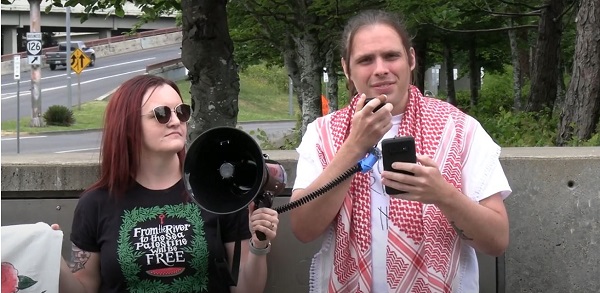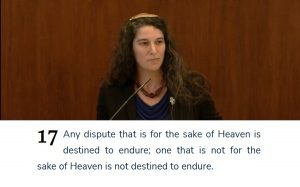UO Gaza hunger strikers: Why we’re participating
10 min read
Presenter: Students, faculty and staff rally May 23 on Day 5 of the UO Gaza hunger strike. Kaleigh Bronson-Cook:
Kaleigh Bronson-Cook: Welcome everybody. Thank you so much for being here today. I’m going to share a little bit about why we’re here, what we’re doing. I’m going to invite some others to come and share about their experiences with the UO Gaza hunger strike that’s ongoing. We’re on Day 5 now.
[00:00:22] So as many of you know, earlier this week on Monday morning at 9 a m., a broad coalition of University of Oregon community members, including students, faculty, staff, started an ongoing rolling hunger strike campaign in solidarity with the starving Palestinians in Gaza.
[00:00:43] This campaign is being organized and led primarily by the campus organization UO Jewish Voice for Peace. The students, faculty, and staff participating in this hunger strike have one primary goal. And that goal is that all who bear witness to the hunger strike that we’re participating in also bear witness to the humanity of Palestinians who are being starved to death en masse in Gaza, and to take every action possible to stop this crime against our shared humanity.
[00:01:16] There is a list of calls to action that we’ll share in a little bit. Those include (that I’m sure other speakers will share about as well): donating directly to starving Gazans; contacting UO and elected leaders; and getting involved in campus and community organizations.
As many of you know, the hunger strikers are demanding that our elected officials in Oregon fight for the end of Israel’s siege on Gaza so that food, humanitarian aid and medical supplies can flow unobstructed to starving Palestinians, and to end U.S. funding for weapons of genocide and starvation.
[00:01:51] We are also calling upon the University of Oregon: to divest from companies that are complicit in genocide and mass starvation; to fulfill their prior commitments to scholarships for Palestinian students; to uphold sanctuary campus protections; and to cease the repression of speech, protest, and academic inquiry related to Palestine on campus.
[00:02:11] While some of our participants have committed to striking indefinitely, which means they’re doing this until they are no longer physically able, others are participating in shorter intermittent strikes, representing UNRWA’s recent report that the average Gazan is only able to eat once every two to three days.
[00:02:33] Hunger strikes, as many of you know, are a time-honored nonviolent tactic that demands moral clarity and collective action. Mass hunger strikes have been used by Palestinian prisoners since at least 1968, including the 2012 Palestinian prisoner hunger strike against indefinite incarceration. For those of you who are not already, you can follow us on Instagram and on TikTok@UOGazaHungerStrike.
[00:03:00] We have daily calls to action usually at noon, noon time, why you’re all here. This is our first action off the UO campus because to us it’s really important that this movement does not just focus on the complicity of University of Oregon leaders but also highlights our government’s and our senators’ and our representatives’ complicity in this ongoing genocide—which is why we’re here today.
[00:03:25] We’re here today also because Sen. Merkley and Sen. Wyden’s offices are inside. We have reached out, I personally have reached out to Sen. Wyden’s office, Sen. Merkley’s office and Rep. Hoyle’s office every single day this week. I’ve only heard back from Sen. Merkley’s office. The rest of our calls have gone unanswered and my voicemails have gone unanswered, emails.
And so later in the program we’re going to invite you all to participate in creating a voice message that we can send them because hopefully our collective voices will be louder than my individual voice and they will respond to our demands and take immediate action to end the siege in Gaza to allow starving Palestinians food.
[00:04:06] First we are going to hear from Phia. Phia has been fasting for five days, so everybody give it up for Phia.
[00:04:20] Phia Dornberg: Hi, my name is Phia. I’m a Palestinian American and today is the fifth day of my indefinite hunger strike in solidarity with the people of Gaza. One of the biggest symptoms I’ve experienced has been the exhaustion, and I would like to say how glad I am to be using the energy I do have to stand here today with all of you demanding that our senators, Jeff Merkley and Ron Wyden, whose offices are in this building, meet with their constituents putting their bodies on the line for Palestine.
[00:04:48] Many of the 14,000 babies that the UN warned were at risk of starvation have already passed away, murdered by Israel’s weaponization of food through intentional starvation. The bombing continues, the bombs continue falling, and our tax dollars continue flowing. The prices of food are still, the price of food that is still available are unattainable for families living in tents after losing all of their worldly possessions in Israeli strikes. (Shame!)
[00:05:16] Without food or medical aid, their bodies are unable to heal from wounds the occupation inflicts. My friend’s 15-year-old son was shot in his hand and the bullet is still lodged there, unable to be removed. One person we are fundraising for has an injured knee that doctors say his body has been unable to recover from, due to the lack of nutrition.
[00:05:38] Stories like these are the heartbreaking norm in Gaza and it serves as an open-air concentration camp where Israel is given rein to torture, starve, and murder its population slowly and painfully. Mass execution of Palestinian aid workers, allowing settlers to burn food before it can enter Gaza, and the bombing of ships attempting to deliver lifesaving supplies are the norm with Israel in charge.
[00:06:03] It is clear that this is by Israel’s design. It is an intentional campaign to ethnically cleanse all of Gaza by systemically murdering and displacing, systematically murdering and displacing all of its Indigenous inhabitants. This is the goal. This is a goal they could not complete without the funding they received from the Biden administration and now the Trump administration and every complicit U.S. administration before them.
[00:06:28] And it is the goal that they cannot complete without our tax dollars and without our complicity. We say no to that complicity. We say no to the weapons of elimination Israel uses, of which we fund 70%. We say no to turning a blind eye and we say no to business as usual. And we demand that our representatives stand with us and scream with us no more.
[00:06:49] We are here. We are your constituents. Meet with us and stand with us against the crime of all crimes or your legacy will be indistinguishable from the war crimes our government has committed and supported. Thank you.
[00:07:07] Kaleigh Bronson-Cook: Thank you so much, Phia. Next we’re going to hear from Efron with Jewish Voice for Peace. Give it up for Efron.
[00:07:19] Efron: Hi guys, I did a solidarity strike from Monday to Wednesday. I did it because for every average Palestinian in Gaza, they only eat one meal per every two to three days. And so I did it for about 60 hours and during that time I was walking to class and, like, I could not imagine walking or running to pick up martyrs or get food because my legs were so weak.
[00:07:52] And then when I was in class I had a bunch of brain fog. People would be like, ‘You’re dozing off, like what’s wrong?’ And I’d be like, ‘I’m on hunger strike,’ and they’d be like, ‘Why are you doing this?’
[00:08:02] And I have to explain the situation. It’s not even a situation, it’s ethnic cleansing. But people in the west have turned a blind eye. This is a little anecdote I’m giving you. I did not prepare this, but I’d like to just let you know how it feels.
[00:08:18] It is excruciating and it’s not fun. People should understand that we’re not doing this to do this. We’re doing this so our university and our elected officials can make the right choice. Right now they’re complicit in genocide and in fact guilty like the West, the rest of the West, so I’ll start with that.
[00:08:41] I’m a Jewish student here at the University of Oregon. I ask myself: What should we do at this moment? I believe it is our moral imperative to fight this starvation and genocide and ethnic cleansing in Gaza. If we do not do everything in our power to act and fight as the U.S. and Israel are committing genocide every day, then we are doing nothing.
[00:09:04] I say we must do more as I say this this is being committed in my name and this is not antisemitism by any means. This is simply ethnic cleansing, as Phia has stated. I don’t think I need to state it more. This is ethnic cleansing. This is dispossession of lands. This did not start Oct. 7. This started on the Nakba Day. It actually started earlier, but if we want to specify the dates: May 15, 1948, for all of you out there.
[00:09:39] This is the continued Nakba. It started in 1948. A cease-fire or liberation has not begun or started. This is the continued Nakba and the U.S. is a partner in crime with Israel. The U.S. wants to further their colonial interest and to continue to commit crimes against humanity. And we should do everything in our power to pressure our politicians. And as Malcolm X says: Make some noise about it.
[00:10:10] As a Jewish person, I’d like to leave you with this. If I’m not for myself, who is for me? But if I’m not for myself, what am I and if not now, when? Do not let your heart harden. We must continue until liberation. Thank you.
[00:10:32] Kaleigh Bronson-Cook: Next we’re going to hear from Ferris. Give it up for Ferris.
[00:10:45] Ferris Haukom: Hello, I’m Ferris Haukom and I’m going into the fourth day of my hunger strike in solidarity with the people of Gaza. Bear with me because I’m a little out of breath from singing and feeling a little weak in general. But I’m doing this to protest the 11-week blockade that Israel has placed on the people of Gaza. This atrocity that seems incomprehensible is being funded by our tax dollars and our representatives. As Phia mentioned, many of the 14,000 babies that the UN predicted to die at the beginning of last week have already passed.
[00:11:15] This is an abstract number on the news. What more can we do to drill it into people’s heads that this is as real as if it were happening in our own streets? People are starving right here, in front of their eyes, are a lot harder to ignore than people starving on the news. A hunger strike forces our bodies to be in physical empathy with those suffering in Palestine.
[00:11:34] No pain we inflict on ourselves can be compared to the devastation of losing your family, your friends, your home, the entire world where you were born, where you played, you went to school, your first kiss, your sister’s wedding, everything you’ve experienced, where you knew every crack in the pavement, every building, every tree, all gone in an instant.
[00:11:50] We can’t know that kind of devastation, but we can at least pause to witness it, to feel it, and to acknowledge it. But beyond that, we can’t let this pass quietly. We call on our senators, Jeff Merkley and Ron Wyden, to respond to our demands and fight to an end to the blockade and the rights of the Palestinian people. No business as usual and free Palestine.
[00:12:13] Dahlia: My name is Dahlia. I’m on my fifth day of the UO Gaza hunger strike. I’m a custodian at the University of Oregon, a member of SEIU Local 85, and a community organizer speaking with you today as a member of Faculty and Staff for Justice in Palestine.
[00:12:30] In occupied Palestine, the naked face of imperialism lays bare the true relationship between the U.S. ruling class and the apartheid Zionist project of Israel. For the better half of a century, Israel has conquered, plundered, terrorized, and exploited the people of Palestine in the name of creating a culturally homogenous and ethnically pure homeland.
[00:12:52] This grotesque disregard for the people suffering under brutal occupation is not a byproduct of the internal political struggles of some far-off remote nation, nor is it isolated from of the beneficiaries of our own military-industrial complex. Without the investment of our capitalist ruling class, Israel could not continue its genocidal aims against the people of Palestine. Shame!
[00:13:19] How can this country’s business and political leadership claim innocence when it is American military hardware, planes, tanks, artillery, and other advanced military technologies, which are being wielded to commit the atrocities against the Palestinians and indeed against humanity?
[00:13:34] Long has the American empire used colonialism in the Global South to ensure that profits continue to rise in the Global North.
[00:13:42] The American war machine is this country’s greatest expense and the business model of organized murder and this country’s top priority. Instead of health care and the right to a decent job and a living wage, instead of a free and equal access to education and a chance at a better future than those who came before us, we have weapons of mass destruction and tools of misery hitherto unimagined. Boo!
[00:14:05] The most wealthy country in the world wastes its stolen fortunes on padding the pockets of the elite few at the top and the war profiteers of a private military technology company. Shame!
[00:14:17] As a working-class person, the gulf between myself and my interests and the ruling class could not be further apart. An injury to one is an injury to all. I stand with the Palestinian people and demand that our elected and university leaders end their complicity in this ongoing genocide and the mass starvation of the people of Gaza. Thank you and free Palestine.
[00:14:46] Presenter: Students, faculty and staff report on the UO Gaza Hunger Strike, which started May 19. For more, follow at UOGazaHungerStrike on Instagram and TikTok.
Field recordings by Todd Boyle for KEPW 97.3, Eugene PeaceWorks community radio.







